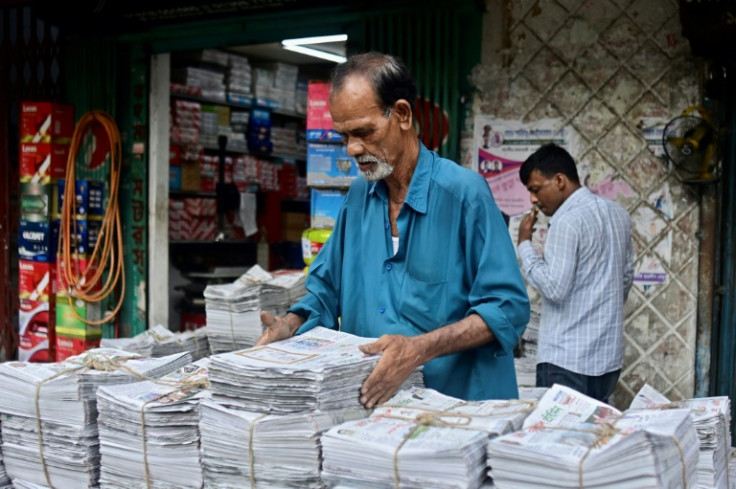India Police Raid Journalists' Homes, Offices Over Allegations Of Chinese Funding

KEY POINTS
- The homes of at least seven journalists associated with the news portal NewsClick were searched
- The investigation began after a New York Times article said NewsClick was part of a Chinese propaganda network
- The raids were criticized by opponents of the Modi government for being the latest attack on independent media
A number of journalists associated with a news website called NewsClick had their homes raided, and laptops and mobile phones seized by the police in the Indian capital city of New Delhi, as part of an ongoing investigation into allegations that the outlet was receiving funds from China.
The Delhi Police conducted raids Tuesday in more than 30 different locations that included the offices and the homes of at least seven journalists associated with the news portal. Some were taken in for questioning, but no arrests have been made so far.
Delhi police landed at my home. Taking away my laptop and Phone...
— Abhisar Sharma (@abhisar_sharma) October 3, 2023
"A special investigations team launched a search operation to identify all those individuals who were possibly getting funds from overseas to run a media group with the main agenda of spreading foreign propaganda," said an official in the interior ministry overseeing the raids by the Delhi Police.
A case was registered against NewsClick on Aug. 17 just days after a New York Times report alleged the website was part of a global network used to spread Chinese propaganda. Tech mogul Neville Roy Singham was allegedly at the center of the global web, the report also said at the time.
While officials said the Tuesday raids were part of the ongoing investigation, critics view it as a strike on news outlets willing to criticize Prime Minister Narendra Modi's government.
The Press Club of India said they "stand in solidarity with the journalists and demand the government to come out with details."
The Press Club of India is deeply concerned about the multiple raids conducted on the houses of journalists and writers associated with #Newsclick.
— Press Club of India (@PCITweets) October 3, 2023
We are monitoring the developments and will be releasing a detailed statement.
Modi's BJP party's opponents also accused the former of launching a fresh attack on the country's media.
"We steadfastly stand with the media and for the constitutionally protected freedoms of speech and expression," said the INDIA alliance, a coalition of more than 25 opposition political parties.
Since the Modi government took leadership in India, press freedom has been a subject of widespread discussion in the world's largest democracy.
BBC offices in India were searched by tax officials weeks after a documentary aired in the U.K., criticizing Modi's involvement in the 2002 riots that took place in the Indian state of Gujarat.
Reporters Without Borders, an advocacy group for journalists, said press freedom in India is in "crisis" due to "violence against journalists, the politically partisan media and the concentration of media ownership." The group also placed India at 161 in its global press freedom rankings.
A government source reportedly said the NewsClick-related raids were not about freedom of speech but about the sovereignty of India.
"The manner of routing of funds and transfer clearly points out to electronic evidences. Large sum of money has been transferred electronically and have been routed further into the system. Payouts have been made to so-called journalist to spread Chinese propaganda. At this stage it is important to secure the evidence and to go to the root of the matter," the source was quoted saying.
India-China ties hit a new low following a clash between the two militaries along their disputed border in 2020. Anti-China sentiments in the country brewed following the clash, leading to New Delhi imposing a ban on Chinese apps like TikTok, WeChat, Weibo and others.
Although China is known to make active efforts to expand its global media influence and to spread news in favor of Beijing, experts say it's been tough for the country to expand its media footprint in India.
"With respect to India, China has been finding it tough as well. Being a democracy Indian media has been free and thus China has not strengthened its influence. China has engaged in giving Indian journalists tours and packages to extend the soft power. But the narrative has not changed a lot," Dr Gunjan Singh, Assistant Professor at Jindal Global Law School, OP Jindal Global University, told International Business Times.
"India has also been the target of relentless Chinese propaganda efforts, however, the pushback has been very strong given the strong anti-China narrative in the country," Marius Dragomir, the Founding Director of the Media and Journalism Research Center -- an independent think tank mapping media worldwide -- told IBT.
"As China does not have access to buying media in India, its efforts at influencing the Indian society have been channeled on boosting its content in Hindi on the social media run by China's main state-owned media," he added. "Without access to influencing surreptitiously media content, China has mostly focused on a strategy of buying adverts in mainstream media outlets."
© Copyright IBTimes 2024. All rights reserved.






















